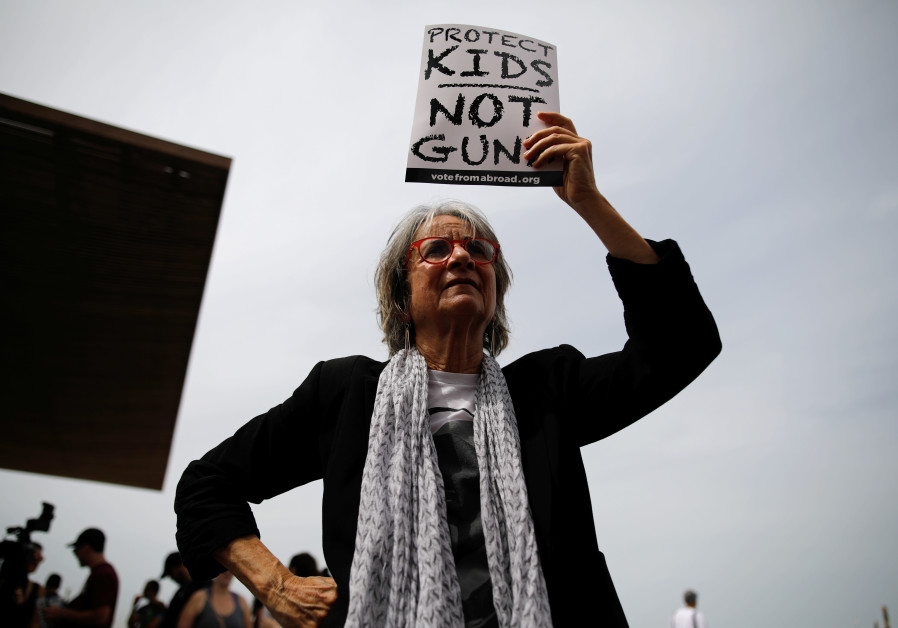Israel has lessons on gun violence for the U.S.

A woman takes part in a protest in front of the US Embassy, calling for enhanced gun control in the US, in Tel Aviv, Israel, March 23, 2018.. (photo credit: REUTERS/CORINNA KERN)
This weekend, in less than 24 hours, 20 people were killed in El Paso, Texas and nine people were killed in Dayton, Ohio as a result of gun violence. The latter attack marked the 250th mass shooting in the United States this year.
A mass shooting is defined as one in which a gunman kills at least four people.
Israel has had success in preventing such attacks, and, say experts, can provide guidance on how to prevent them in the future.
While many people in Israel carry guns, there are fewer mass shootings per capita than in the US due to more restrictive gun regulations.
According to Israeli government statistics, about 40 percent of applications for gun permits are denied.
Those that are granted are done so mainly in cases where the licensing authority believes an individual has a specific need for a firearm. One example is Israelis living in communities in the West Bank, which remains plagued by Palestinian attacks on civilians.
Gun permits in Israel must be renewed regularly, and owners must undergo a psychological evaluation before receiving a weapon and at set intervals thereafter.
In 2018, Jerusalem passed legislation loosening restrictions on the ownership of guns, making them accessible to about 600,000 potential applicants – or about 1 in every 15 Israeli civilians. After suffering from years of terrorism, some politicians, particularly on the right, have urged Israelis to arm themselves.
While the Israeli police this week announced that more than 3,600 weapons were confiscated and thousands of people arrested on related charges in the first half of 2019, there remain thousands of illicit arms throughout the country, especially in Arab communities.
Regarding the US, it is estimated that there are more guns than people in the country.
“America is exceptional because of its attitude towards guns,” Prof. Jonathan Rynhold, deputy head of the department of political studies at Bar-Ilan University, told The Media Line. “Any other country would see this as a threat to the well-being of its citizens and would put more restrictions on gun ownership.”
Besides tighter gun control, which limits who can own and carry a weapon, Rynhold said Israel views mass shootings differently than Washington does and thus invests more resources into preventing them.
“In Israel, it’s a national security issue, as mass shootings are viewed as terrorist attacks. In America, it’s about personal safety. The US puts a lot of resources into what it calls homeland security.”
Danny Yatom, former director of Israel’s Mossad spy agency, told The Media Line that it is time for the US to change its attitude toward gun violence.
“Maybe the United States should view it as a terrorist attack, even though the one who squeezed the trigger is American,” Yatom said. “The murderer comes equipped with weapons to slaughter innocent people. That’s exactly what terrorism is.”
He added that if America invested the same amount of money and resources into stopping gun violence as it does to prevent al-Qa’ida-style terrorist attacks, it might have more success in curbing the former incidents.
While Yatom praised the tactical response of the US’ SWAT teams to shootings, he said their main problem is that they arrive after casualties occur, which is too late.
“The first and foremost element in order to succeed in foiling terrorist attacks is [accumulating] accurate intelligence in real-time,” Yatom said.
He noted that the biggest problem in the Texas shooting, for example, was the failure of law enforcement to pick up on the killer’s messages on social media, indicating that he was about to carry out an attack.
Yatom advocated for the US government to develop a system that is capable of combing through social networks and flagging individuals who could be potential shooters. Laws would then be needed to allow authorities to question a suspect before he or she carries out a shooting.
Yatom also recommended placing guards with firearms at the entrances to every public place people frequent, similar to the case in Israel where the government often pays for private security companies.
“Having armed guards trained to deal with people who are intent on shooting innocent people will prevent many of the successes these murderers have had,” Yatom said.
He also offered practical advice to business owners as well as to those who find themselves in a location with an active shooter.
The former should identify and secure vulnerable points in their establishments and install metal detectors, Yatom said. They can also build obstacles like a fence so that there are only one or two places for people to enter.
“This will help because it is easier to secure fewer places,” he stressed. “This also applies to schools and universities.”
For civilians in the midst of a mass shooting, Yatom advised people who are armed to try and stop the individual, but only if they are trained to do so.
He suggested that everyone else hide and call the authorities as quickly as possible to apprise them of the situation.
Yatom concluded that the gun lobby is a powerful force in Washington, which prevents new laws from being enacted to address gun violence. As a result, he said it should be the responsibility of the National Guard to assist in stopping the mass shooting epidemic in America.
For more stories, go to themedialine.org
Join Jerusalem Post Premium Plus now for just $5 and upgrade your experience with an ads-free website and exclusive content. Click here>>






Comments are closed.